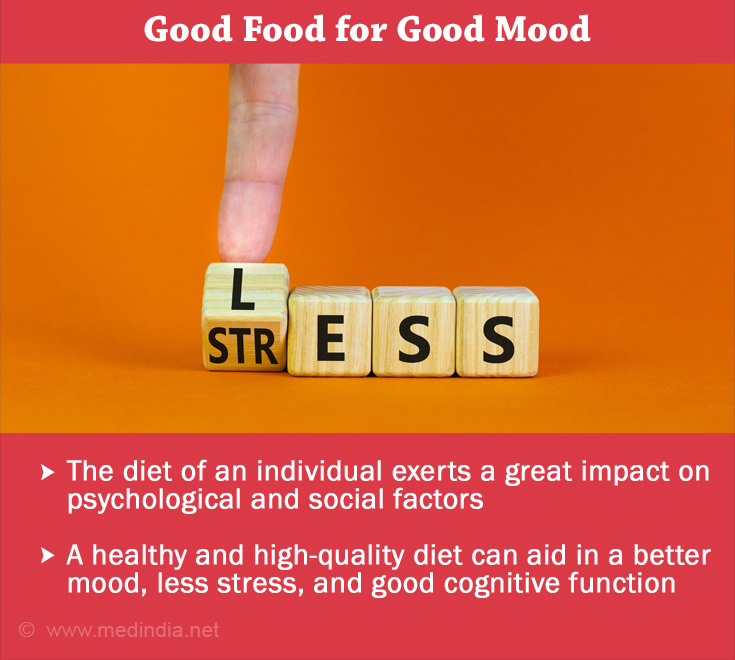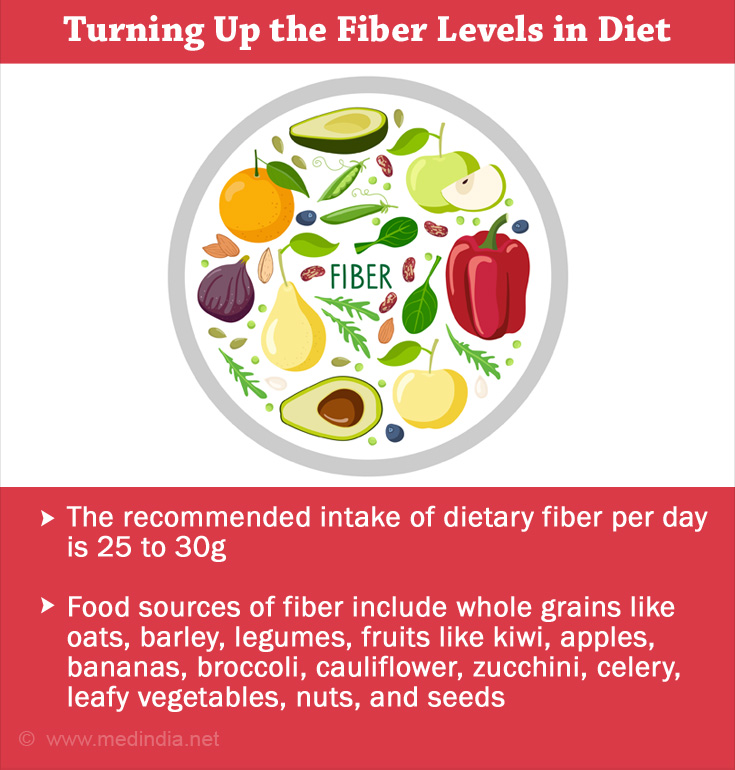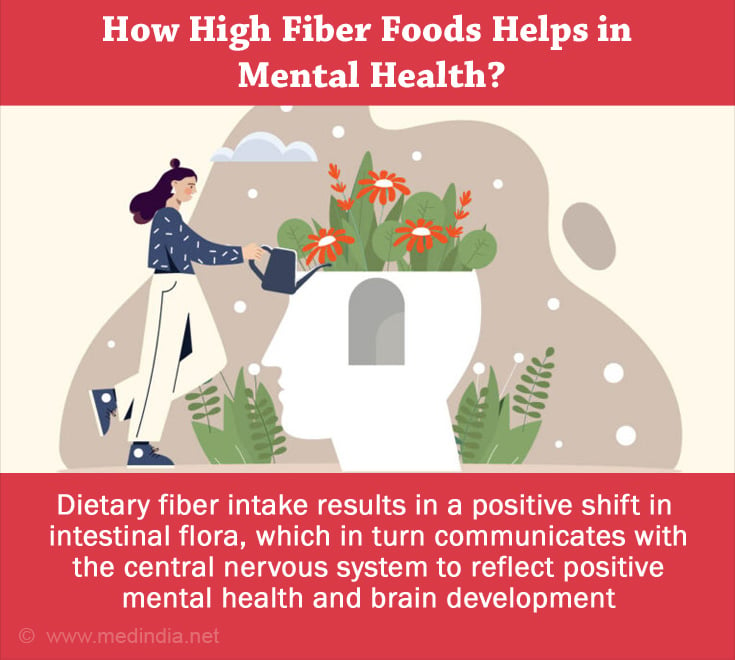- Dietary fibre and the gut–brain axis: Microbiota-dependent and independent mechanisms of action - (https://www.cambridge.org/core/journals/gut- microbiome/article/dietary-fibre-and-the-gutbrain-axis-microbiotadependent-and-independent-mechanisms-of-action/3844C700341E536779F0E35042B5F7AE)
- Dietary fibre and the gut-brain axis: Microbiota-dependent and independent mechanisms of action. - (https://www.cambridge.org/core/journals/gut-microbiome/article/dietary-fibre-and-the-gutbrain-axis-microbiotadependent-and-independent-mechanisms-of-action/3844C700341E536779F0E35042B5F7AE)
- Consumption of Dietary Fiber in Relation to Psychological Disorders in Adults - (https://www.frontiersin.org/articles/10.3389/fpsyt.2021.587468/full)
- Diet and Mental Health: Review of the Recent Updates on Molecular Mechanisms - (https://www.mdpi.com/2076-3921/9/4/346)
- Food and mood: how do diet and nutrition affect mental wellbeing? - (https://www.bmj.com/content/369/bmj.m2382)
- Increasing Fiber Intake - (https://www.ucsfhealth.org/education/increasing-fiber-intake)
- A prospective analysis of dietary fiber intake and mental health quality of life in the Iowa Women's Health Study - (https://www.maturitas.org/article/S0378-51221930546-8/fulltext)
- High fiber diet - (https://www.ncbi.nlm.nih.gov/books/NBK559033/)
- A prospective analysis of dietary fiber intake and mental health quality of life in the Iowa Women's Health Study - (https://www.maturitas.org/article/S0378-5122(19) 30546-8/fulltext)
- Fiber up for mental health - (https://www.matherhospital.org/weight-loss-matters/fiber-up-for-mental-health/)
- Sources of Dietary Fiber Are Differently Associated with Prevalence of Depression - (https://www.mdpi.com/2072-6643/12/9/2813)
About
Dietary fiber is an umbrella term which is used to denote a class of carbohydrates that are not digested by the human system. Rather, they are fermented by the gut microbiota in the colon. Several physical health benefits of high-fiber foods have been established by research. In addition, studies have demonstrated rewarding effects on mental health, making it a wholesome nutrient(1✔ ✔Trusted Source
Dietary fibre and the gut–brain axis: Microbiota-dependent and independent mechanisms of action
Go to source).
The prevalence of mental disorders is increasing worldwide. In conjunction with poor dietary habits, poor mental health may also spark chronic diseases(2✔ ✔Trusted Source
Consumption of Dietary Fiber in Relation to Psychological Disorders in Adults
Go to source). However, it should be noted that poor dietary habits, may also in turn, stimulate mental disorders. This association between diet and mental health is termed nutritional psychiatry in research. Studies focused on the relationship between dietary habits and specific nutrients have identified fiber as an important nutrient of benefit to mental health(3✔ ✔Trusted Source
Diet and Mental Health: Review of the Recent Updates on Molecular Mechanisms
Go to source).
Food and Mood
Food choices may differ depending on one's mood. Similarly, one's mental health can also be changed with certain food intake. The diet of an individual exerts a great impact on psychological and social factors. A healthy and high-quality diet can aid in a better mood, less stress, and good cognitive function(4✔ ✔Trusted Source
Food and mood: how do diet and nutrition affect mental wellbeing?
Go to source).
The present world has seen transitions in many forms including a nutrition transition. The shift of gears from traditional dietary patterns to westernized diets comes along with chronic health diseases. The westernized diet is high in refined sugar, trans-fats, sodium, and calories, while being low in fiber(3✔ ✔Trusted Source
Diet and Mental Health: Review of the Recent Updates on Molecular Mechanisms
Go to source).
A diet high in processed carbohydrates may increase the risk of depression and anxiety. Consuming foods high in glycemic load ignites the secretion of hormones like cortisol, growth hormone, glucagon, and adrenaline that may trigger irritability, anxiety, and other such mood disorders(4✔ ✔Trusted Source
Food and mood: how do diet and nutrition affect mental wellbeing?
Go to source).

What is High Fiber Diet?
The recommended intake of dietary fiber per day is 25 to 30g. A high-fiber diet refers to a diet that meets or exceeds the recommended intake. Fiber is classified into soluble and insoluble fiber based on its physio-chemical properties. Soluble fiber is derived from the inner flesh of plants like pectin, mucilage, and gums.
Food sources of soluble fiber include oats, barley, fruits, broccoli, beans, peas, legumes, and root vegetables like carrots. Soluble fiber aids in modifying blood glucose and cholesterol levels. Insoluble fiber or fermentable fiber is obtained from the outer skin of plants and helps in promoting laxation.
Sources of insoluble fiber include the skin of fruits like apples, bananas, avocados, corn bran, cauliflower, zucchini, celery, green beans, tomatoes, kiwi, leafy vegetables, whole grains, nuts, and seeds(5✔ ✔Trusted Source
Increasing Fiber Intake
Go to source, 6✔ ✔Trusted Source
High fiber diet
Go to source).

Role of Fiber in Mental Health
The highly prevalent mental disorder among the general population is identified to be depression. About 4.4% of the globe's population is reported to be suffering from depression by the World Health Organization (WHO)(2✔ ✔Trusted Source
Consumption of Dietary Fiber in Relation to Psychological Disorders in Adults
Go to source).
Negative mood symptoms such as worry, fear, emotional tension, lack of interest, and impaired cognition that are noticed with depression, stress, and anxiety have been shown to be prevented with a high fiber intake. Some clinical data also suggest that impaired cognition like attention, executive functioning, and mental flexibility could be restored with adequate dietary fiber intake(1✔ ✔Trusted Source
Dietary fibre and the gut–brain axis: Microbiota-dependent and independent mechanisms of action
Go to source).
A study conducted among the adult population revealed associations between dietary fiber intake and depressive symptoms. Individuals consuming the highest amounts of fiber had a lower risk of anxiety (33%) and psychological distress (29%). Women consuming a high fiber intake showed reduced symptoms of depression than men. The study also identified that an increased fiber intake among overweight and obese individuals turned down the risk of psychological distress(2✔ ✔Trusted Source
Consumption of Dietary Fiber in Relation to Psychological Disorders in Adults
Go to source).
Another study among Chinese adults showed that a high intake of fruits and vegetables attenuates the incidence of depression, whereas consuming high-sugar foods like cakes, candied fruits, ice cream, and animal foods increases depression symptoms(7✔ ✔Trusted Source
A prospective analysis of dietary fiber intake and mental health quality of life in the Iowa Women's Health Study
Go to source). Fiber-rich vegetables and fruits also contain bioactive components like antioxidants and vitamins that assist in tapering the risk of depression(2✔ ✔Trusted Source
Consumption of Dietary Fiber in Relation to Psychological Disorders in Adults
Go to source).
A study examined the effect of specific fiber-rich foods on depression among Korean adults. The results revealed that the intake of vegetables, fruits, cereal, seaweed, and mushrooms had an inverse relationship with depression. The study also noted that fiber intake from seaweed improved the clinical symptoms of depression(9✔ ✔Trusted Source
Sources of Dietary Fiber Are Differently Associated with Prevalence of Depression
Go to source).
How High Fiber Foods Help in Mental Health?
The mechanism behind the relationship between dietary fiber and mental wellness can be explained by the effect of dietary fiber on gut microbiota. The gut microbiota performs a primary role in the fermentation of dietary fiber. Dietary fiber consumption results in a positive shift in intestinal flora, which in turn communicates with the central nervous system to reflect positive mental health and brain development(2✔ ✔Trusted Source
Consumption of Dietary Fiber in Relation to Psychological Disorders in Adults
Go to source).
Diets high in fat and low in fiber showed to interrupt the biodiversity in the microbiome, thereby increasing the permeability of the gut and production of inflammatory bacterial species that spark systemic inflammation. The inflammation arising may be linked to depression and anxiety symptoms among animals and humans, states studies(7✔ ✔Trusted Source
A prospective analysis of dietary fiber intake and mental health quality of life in the Iowa Women's Health Study
Go to source).
Serotonin, also known as the 'happy hormone' is produced majorly in the gut. This hormone is known to be linked with reducing psychological disorders like anxiety and depression. A high-fiber diet helps in maintaining a diverse gut microbiome thereby nurturing the production of serotonin hormone(8✔ ✔Trusted Source
Fiber up for mental health
Go to source).

Bottom Line
Food and mood are interrelated with each other. Emerging evidence demonstrates that consuming fiber-rich foods sparks a positive mental state. Consuming a fiber-rich diet like the Mediterranean diet (that is high in fruits, vegetables, whole grains, and less red meat and processed foods) can hinder psychological disorders like stress, depression, and anxiety(9✔ ✔Trusted Source
Sources of Dietary Fiber Are Differently Associated with Prevalence of Depression
Go to source).











